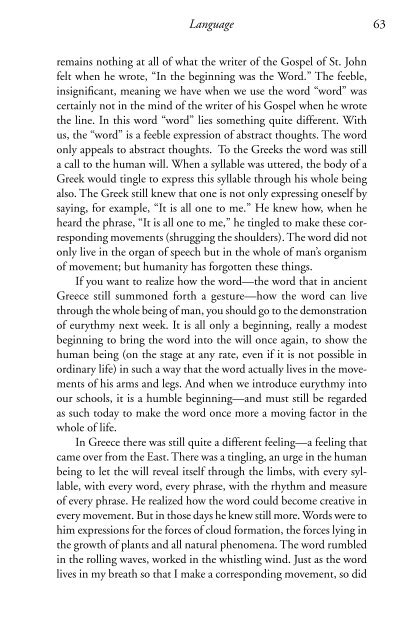Teaching Language arTs in The WaLdorf schooL
Teaching Language arTs in The WaLdorf schooL
Teaching Language arTs in The WaLdorf schooL
Create successful ePaper yourself
Turn your PDF publications into a flip-book with our unique Google optimized e-Paper software.
<strong>Language</strong><br />
63<br />
rema<strong>in</strong>s noth<strong>in</strong>g at all of what the writer of the Gospel of St. John<br />
felt when he wrote, “In the beg<strong>in</strong>n<strong>in</strong>g was the Word.” <strong>The</strong> feeble,<br />
<strong>in</strong>significant, mean<strong>in</strong>g we have when we use the word “word” was<br />
certa<strong>in</strong>ly not <strong>in</strong> the m<strong>in</strong>d of the writer of his Gospel when he wrote<br />
the l<strong>in</strong>e. In this word “word” lies someth<strong>in</strong>g quite different. With<br />
us, the “word” is a feeble expression of abstract thoughts. <strong>The</strong> word<br />
only appeals to abstract thoughts. To the Greeks the word was still<br />
a call to the human will. When a syllable was uttered, the body of a<br />
Greek would t<strong>in</strong>gle to express this syllable through his whole be<strong>in</strong>g<br />
also. <strong>The</strong> Greek still knew that one is not only express<strong>in</strong>g oneself by<br />
say<strong>in</strong>g, for example, “It is all one to me.” He knew how, when he<br />
heard the phrase, “It is all one to me,” he t<strong>in</strong>gled to make these correspond<strong>in</strong>g<br />
movements (shrugg<strong>in</strong>g the shoulders). <strong>The</strong> word did not<br />
only live <strong>in</strong> the organ of speech but <strong>in</strong> the whole of man’s organism<br />
of movement; but humanity has forgotten these th<strong>in</strong>gs.<br />
If you want to realize how the word—the word that <strong>in</strong> ancient<br />
Greece still summoned forth a gesture—how the word can live<br />
through the whole be<strong>in</strong>g of man, you should go to the demonstration<br />
of eurythmy next week. It is all only a beg<strong>in</strong>n<strong>in</strong>g, really a modest<br />
beg<strong>in</strong>n<strong>in</strong>g to br<strong>in</strong>g the word <strong>in</strong>to the will once aga<strong>in</strong>, to show the<br />
human be<strong>in</strong>g (on the stage at any rate, even if it is not possible <strong>in</strong><br />
ord<strong>in</strong>ary life) <strong>in</strong> such a way that the word actually lives <strong>in</strong> the movements<br />
of his arms and legs. And when we <strong>in</strong>troduce eurythmy <strong>in</strong>to<br />
our schools, it is a humble beg<strong>in</strong>n<strong>in</strong>g—and must still be regarded<br />
as such today to make the word once more a mov<strong>in</strong>g factor <strong>in</strong> the<br />
whole of life.<br />
In Greece there was still quite a different feel<strong>in</strong>g—a feel<strong>in</strong>g that<br />
came over from the East. <strong>The</strong>re was a t<strong>in</strong>gl<strong>in</strong>g, an urge <strong>in</strong> the human<br />
be<strong>in</strong>g to let the will reveal itself through the limbs, with every syllable,<br />
with every word, every phrase, with the rhythm and measure<br />
of every phrase. He realized how the word could become creative <strong>in</strong><br />
every movement. But <strong>in</strong> those days he knew still more. Words were to<br />
him expressions for the forces of cloud formation, the forces ly<strong>in</strong>g <strong>in</strong><br />
the growth of plants and all natural phenomena. <strong>The</strong> word rumbled<br />
<strong>in</strong> the roll<strong>in</strong>g waves, worked <strong>in</strong> the whistl<strong>in</strong>g w<strong>in</strong>d. Just as the word<br />
lives <strong>in</strong> my breath so that I make a correspond<strong>in</strong>g movement, so did

















